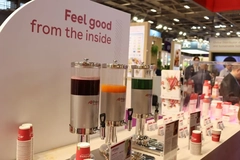Recycling Greenhouse Gas Fossil Fuel Emissions into Low Radiocarbon Food Products to Reduce Human Genetic Damage

Unlike carbon dioxide (CO2) in the atmosphere, CO2 captured directly from most fossil fuel emissions contains little or no radiocarbon. Williams suggests recycling this low radiocarbon CO2 to grow food having little or no radiocarbon.
25/05/07 A scientific paper just published in the international journal Environmental Chemistry Letters offers a surprising method for producing safer foods that could reduce cancer rates, birth defects, and rates of aging, as well as simultaneously play a significant role in fighting global warming. The complete journal article is freely available online at http://dx.doi.org/10.1007/s10311-007-0100-7 or by email request to article1@radiocarb.com.
In this paper, biochemist Christopher P. Williams calculates that radioactive carbon-14, or radiocarbon, naturally found in the atmosphere and in all food, causes at least 34 billion DNA and chromosomal damage events during an ordinary human lifetime. This genetic damage could account for a significant number of spontaneous cancers or birth defects, as well as accelerate the aging process.
Unlike carbon dioxide (CO2) in the atmosphere, CO2 captured directly from most fossil fuel emissions contains little or no radiocarbon. Williams suggests recycling this low radiocarbon CO2 to grow food having little or no radiocarbon. Adults, whose DNA and other genetic material are already formed, would likely receive little benefit from such low radiocarbon food. However, growing children receiving this safer, less radioactive food could be spared billions of lifetime genetic damage events.
Worldwide emissions of the greenhouse gas CO2 from fossil fuels exceed 27 billion tons per year, or more than four tons per person. A key method being considered for reducing global warming is to capture, or sequester, CO2 from industrial fossil fuel emissions. However, the capture and long-term storage of CO2 is expensive and previously served no significant business purpose. But now, with the potential to recycle this formerly useless waste material into low radiocarbon food products, carbon sequestration projects to fight global warming may receive a considerable boost.
John A. Jaszczak, Professor of Physics at Michigan Technological University, commented, "I found the idea of conserving the low radiocarbon CO2 emissions for plant growth and human food consumption, especially for prenatal and newborn babies, to be an exciting one. I hope it will catch the attention of funding agencies and inspire long-overdue experimental research. The potential positive ramifications for both human well-being and the environment are too significant to ignore."
Noting one implication of his paper, Williams comments that Richard Branson's $25 million "Virgin Earth Challenge" to remove greenhouse gases directly from the atmosphere may be misguided since it promotes the capture and sequestration of dilute atmospheric CO2 containing natural background radiocarbon. In contrast, capturing concentrated low radiocarbon CO2 directly from industrial fossil fuel emissions before it enters the atmosphere is both easier and cheaper, and also permits its eventual recycling into safer, less radioactive foods.












